Croatian Foreign Trade of Goods With Russia and Ukraine
24th March 2022 – An overview of the Croatian foreign trade of goods with Russia and Ukraine in relation to the Russian invasion of Ukraine and the imposed economic sanctions on Russia.
It has been exactly one month since Russia has invaded Ukraine. Nobody knows how much more the war is going to last and we can only hope it will end soon. This is certainly one of the biggest humanitarian crises the European continent has seen in a long time. The West reacted rather promptly to the Russian invasion by imposing severe economic sanctions on the Russian Federation in an effort to persuade Russian leadership to stop the war.
Since the invasion has started, the European Union has adopted four packages of economic sanctions. Even though these sanctions still do not include all parts of the Russian economy, consumers and corporations are often choosing not to do business with Russia and Russian companies on their own initiative. I will provide an overview of the Croatian foreign trade of goods with Russia and Ukraine which will give us a better approximation of the Croatian position in these extreme circumstances.
EXPORTS
In 2021 Croatia exported 204 million Euros of goods to Russia which represents 1.1% of the total Croatian export of goods. In the last few years, Croatian export of goods to Russia has been on the rise, but they are still 28% lower than the level in 2013. In the same period, the relative share of exports to Russia has fallen from 2.9% to 1.1%.
On the other hand, Croatia has exported 58 million Euros worth of goods to Ukraine in 2021 which represents 0.3% of the total Croatian export of goods. In the observed period exports to Ukraine have been rising in absolute terms by 157% beating the total exports growth of 99%. In relative terms exports to Ukraine were fluctuating between 0.1% and 0.4%.
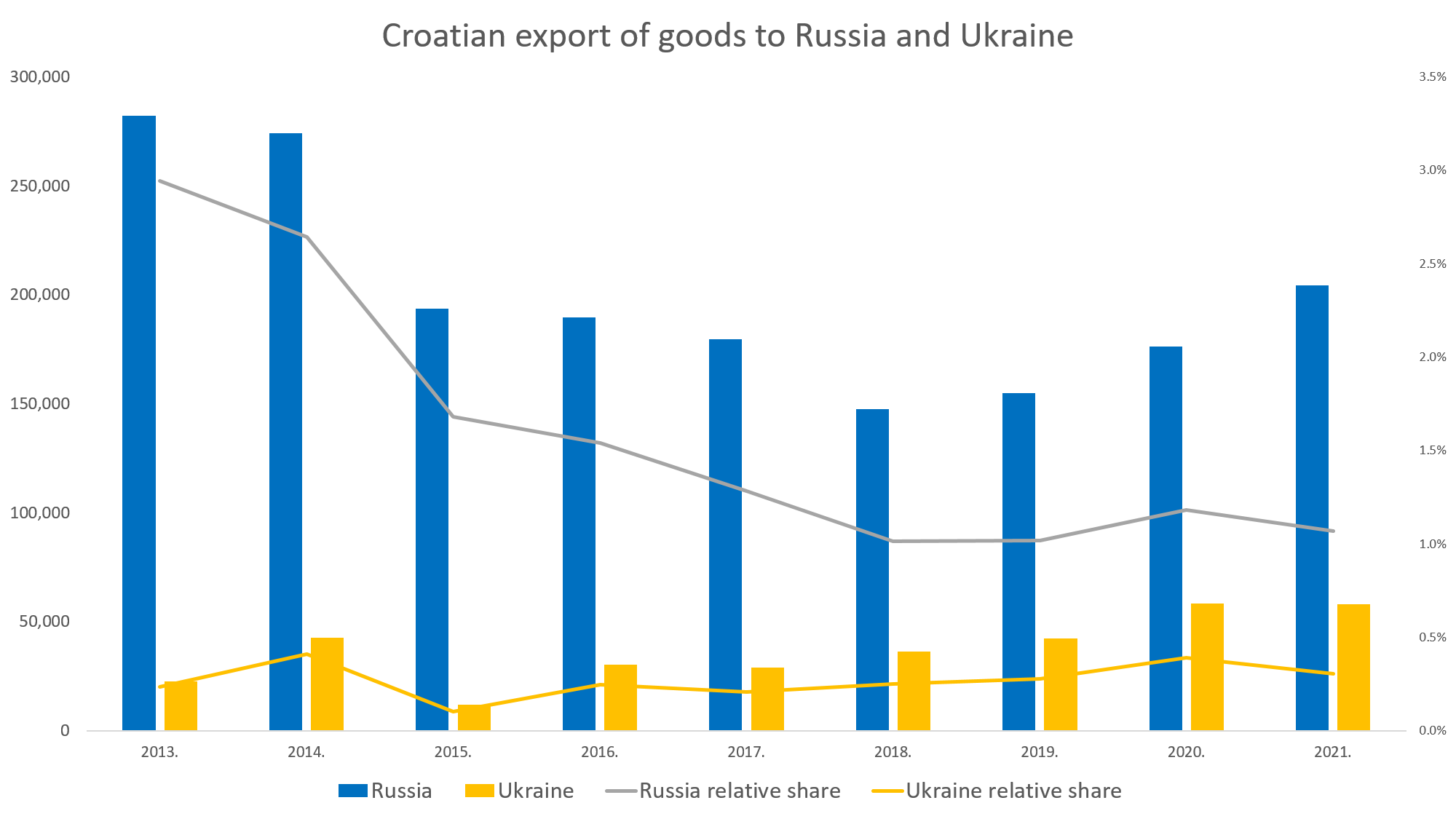
When comparing exports to Russia and Ukraine to other markets we can see that their relative importance in terms of total Croatian exports is very small. The biggest Croatian trade partner is the European Union with 69.2% of exports, followed by CEFTA countries and other countries in America with 16.3% and 3.6% respectively. What is more Russian market does not come even close to the top ten exporting countries and is far behind the Croatian traditional trade partners such as Slovenia with 13%, Italy 12%, Germany 12%, and Hungary and Bosnia and Herzegovina both with 9%.
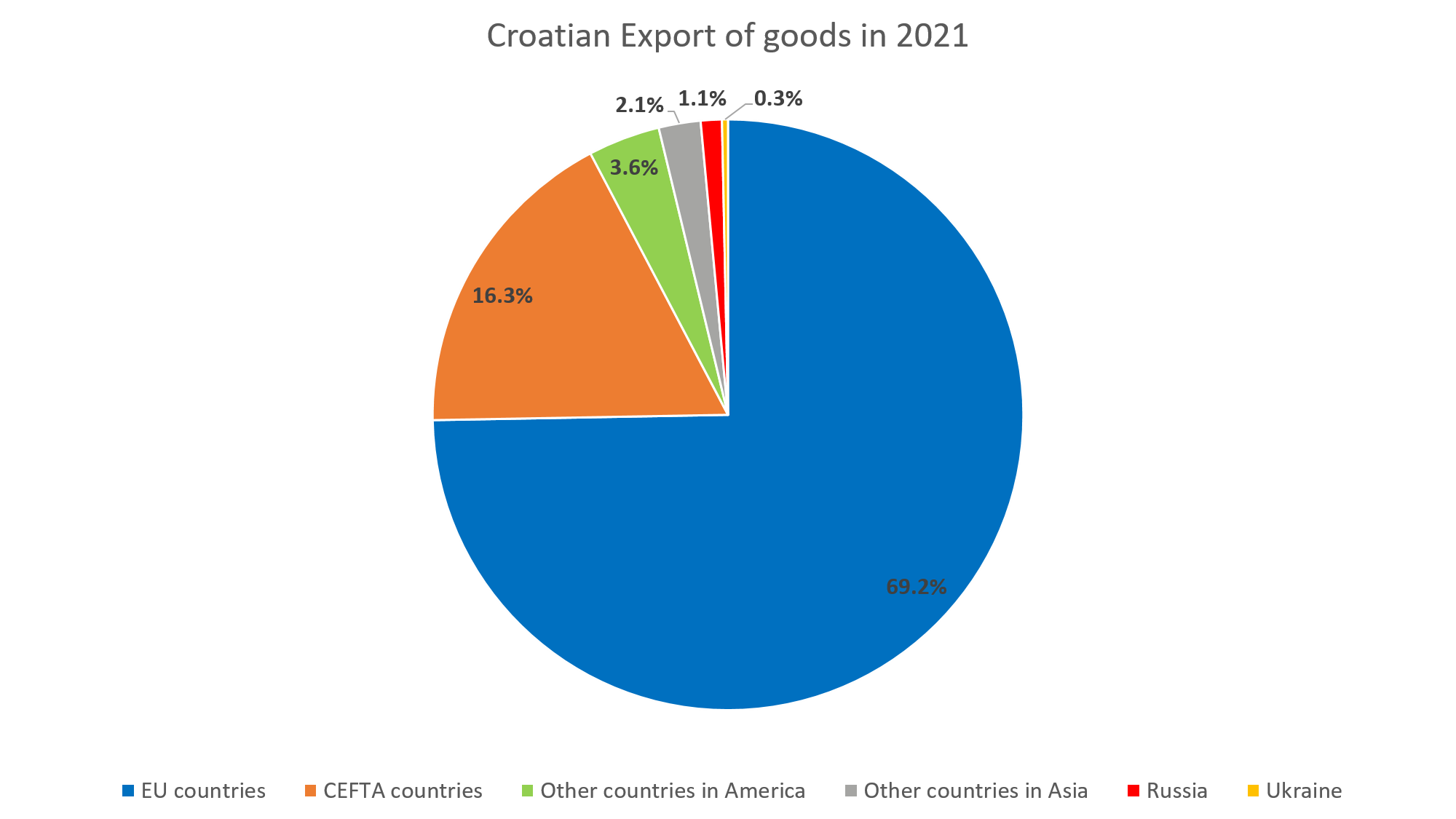
In order to dig deeper into the structure of the Croatian exports of goods to Russia and Ukraine, I have used the official Combined Nomenclature (CN) from the European Union. The breakdown of the exports by the CN is provided by the DZS and the provided data is from 2020. In the case of both Russia and Ukraine, we can see that pharmaceutical products hold the largest share of exports with 39% and 32,2% respectively. The combined export of pharmaceutical products to Russia and Ukraine account for 8.62% of total Croatian export of the same category of products. Additionally, categories (85) and (12) can be found in both Russian and Ukrainian top 5 export categories and they make up 0.64% and 17.32% of the Croatian exports in those categories, respectively.
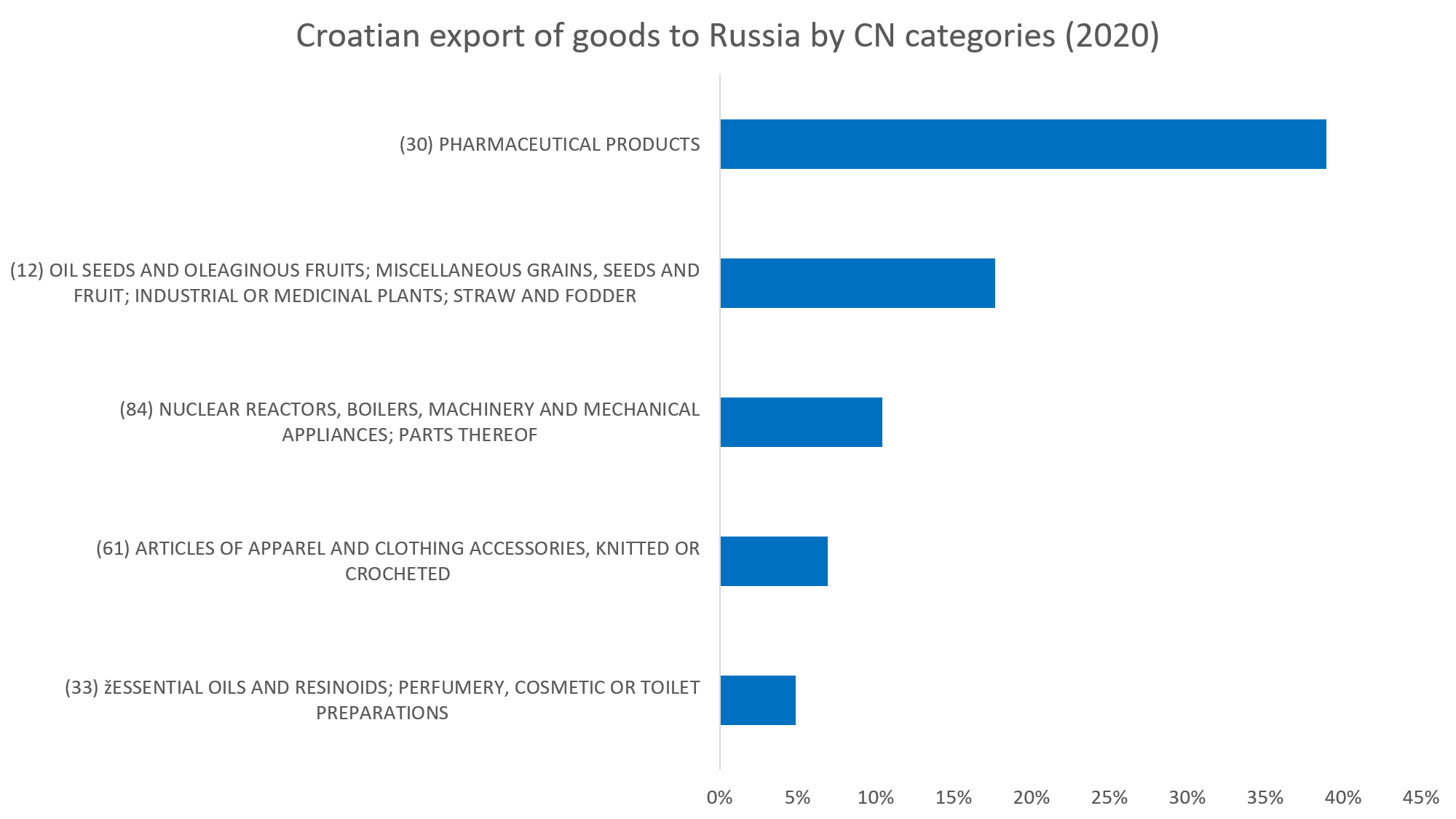
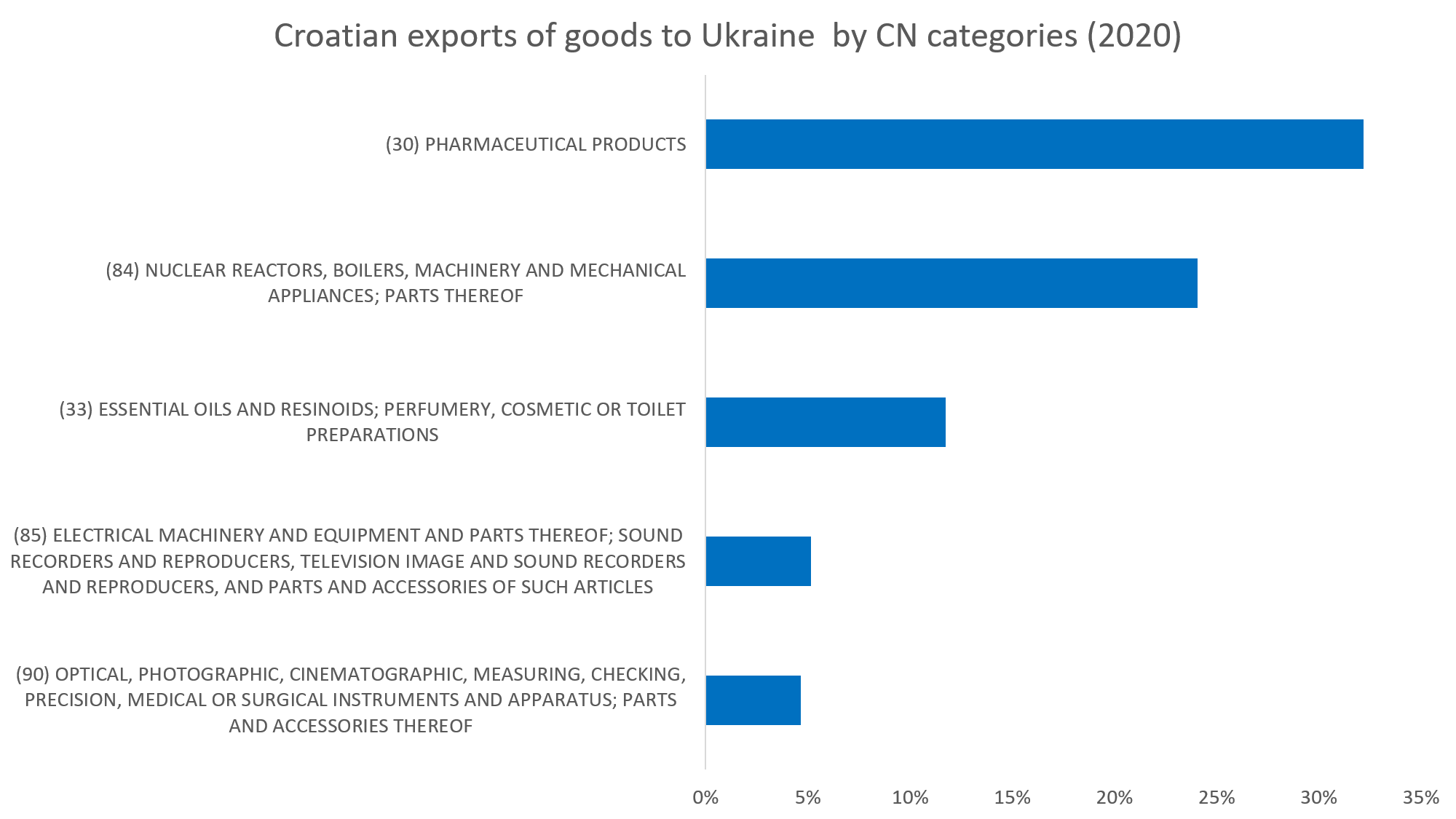
IMPORTS
Croatian imports from Russia have amounted to 463 million Euros worth of goods in 2021, which was a rise of almost 100% compared to 2020. Despite the steep rise imports from Russia are still lower by 38% compared to 2013. The relative share of Russian imports in the total Croatian imports has fallen from 4,5% in 2013 to 1,6% in 2021.
In 2021 Croatia has imported 44 million Euros worth of goods from Ukraine which is a drop of 67% from the peak in 2013. The relative share of Ukrainian imports also fell in 2014 and is around 0.2% since then.
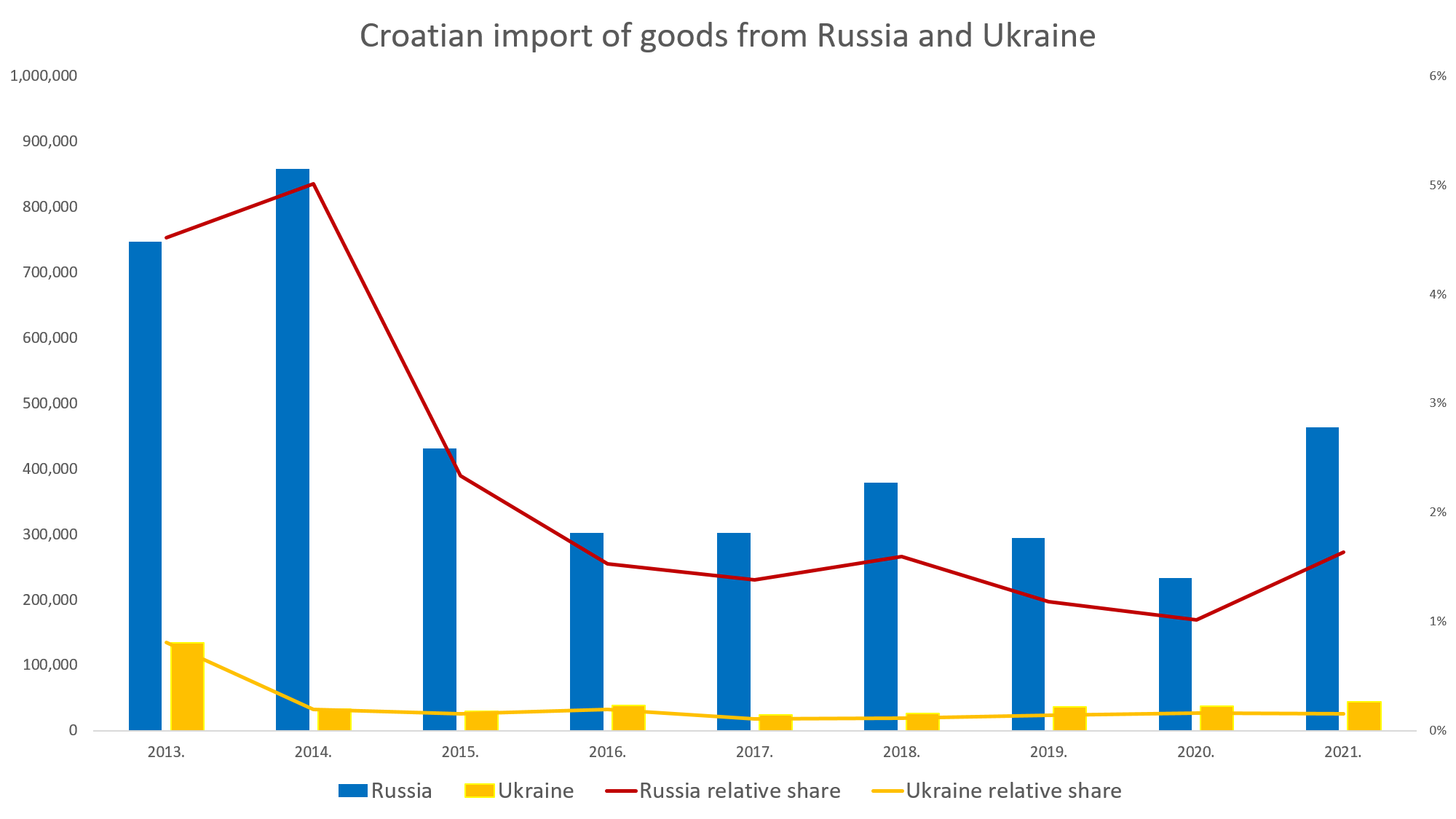
Again, as with the exports, to put it into perspective we can observe the relative share of the Russian and Ukrainian imports compared to other markets. Not surprisingly, EU markets make up the largest share of Croatian imports with 76.5%, followed by CEFTA countries and other countries in Asia with 6.8% and 7.7% respectively. Here we see the same pattern as we did with exports, the Croatian economy is not very reliant on neither Russian nor Ukrainian imports. Moreover, Russia is not even close to Croatia’s biggest importers such as Germany 15%, Italy 13%, Slovenia 11%, Hungary 7%, and Austria 6%.
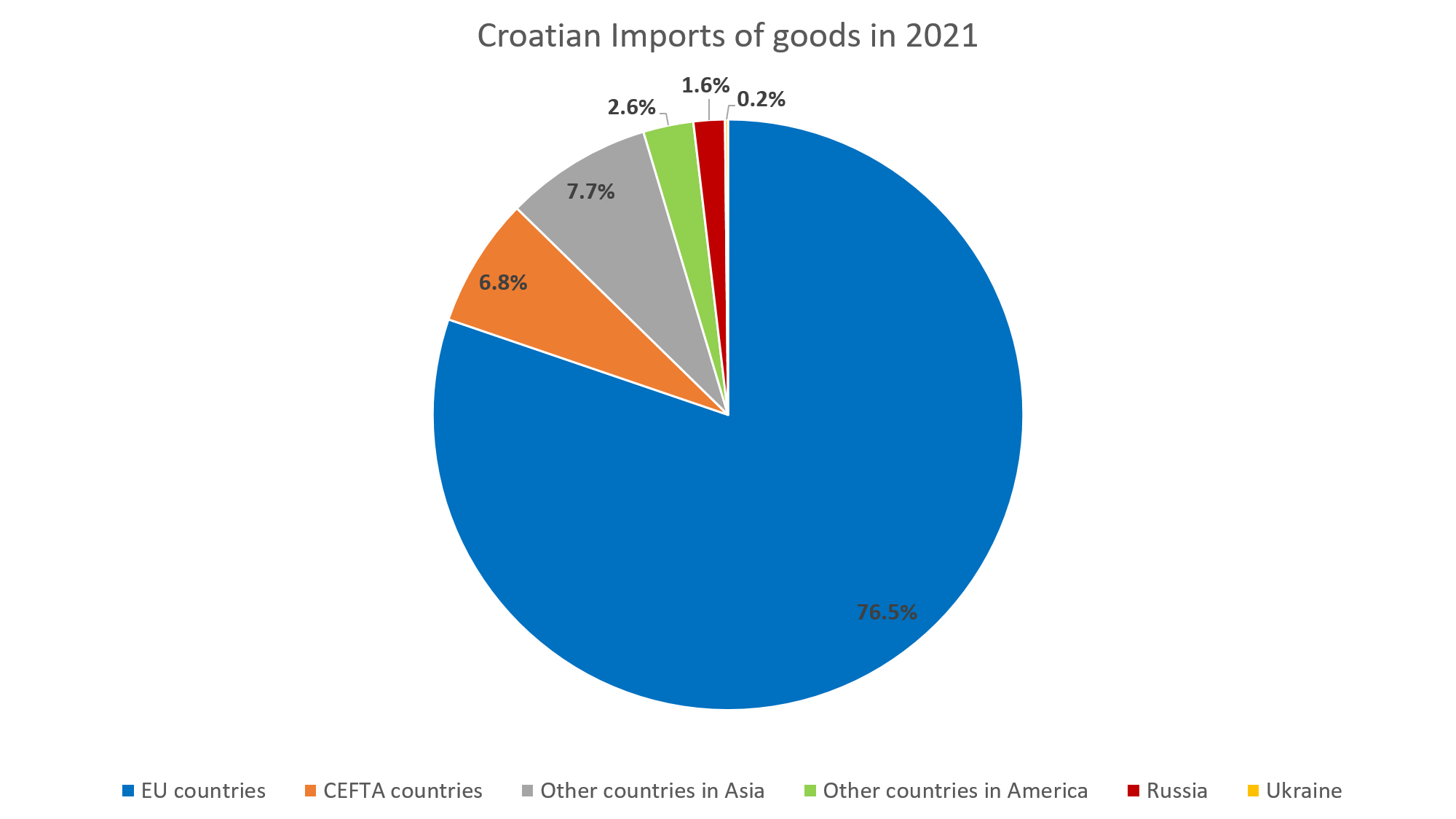
When observing the CN categories, we can see that imports from Russia are dominated by mineral fuels and oils which make up 55.8% of total imports from Russia. However, the relative share of mineral fuels and oils from Russia makes up just 6.6% of total Croatian imports of the same category. Not surprisingly other important categories are metals such as aluminum and copper as well as fertilizers.
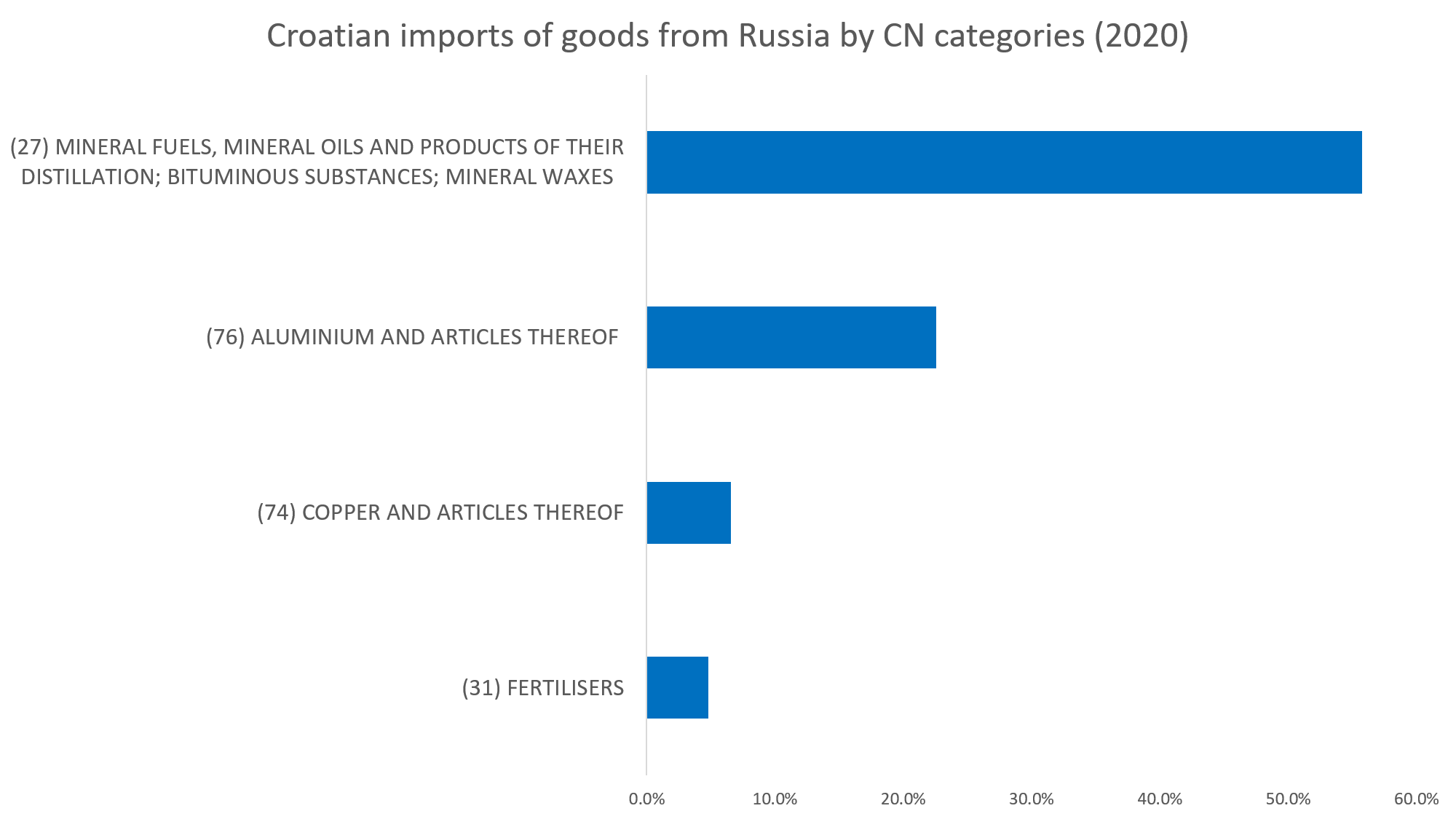
Croatian imports from Ukraine are more evenly distributed and two main categories are (84) and (85) which together account for 1/3 of imports and these are both important export categories to Ukraine as well.
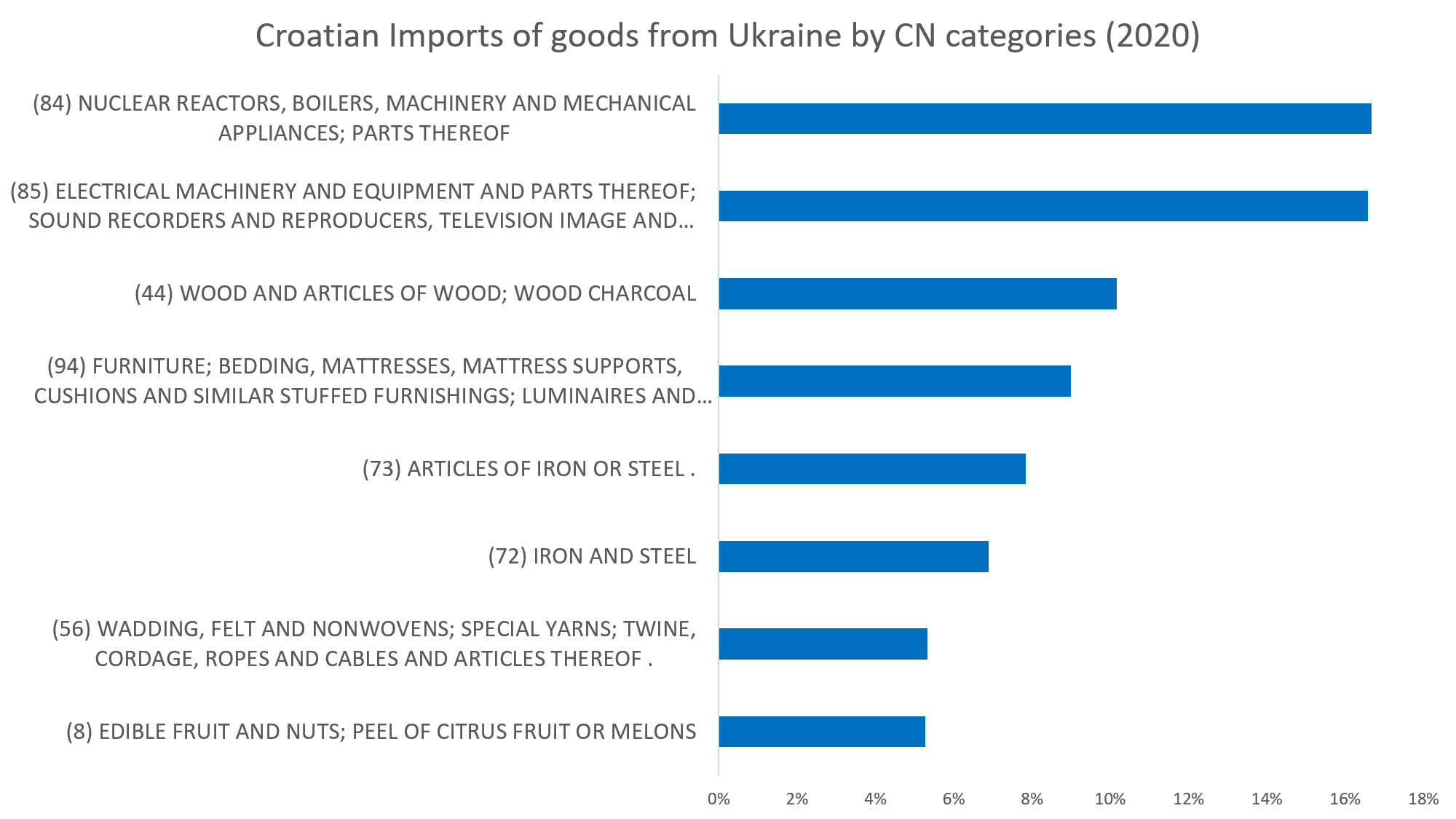
BALANCE OF TRADE
As seen on the graph below, Croatia ended 2021 with a positive trade balance with Ukraine in the amount of 14 million Euros. Since 2017 Croatia has maintained a trade surplus with Ukraine. On the other side, the Croatian trade balance with Russia was negative throughout the whole observed period. In 2021 Croatia had a trade deficit in the amount of 259 million Euros.
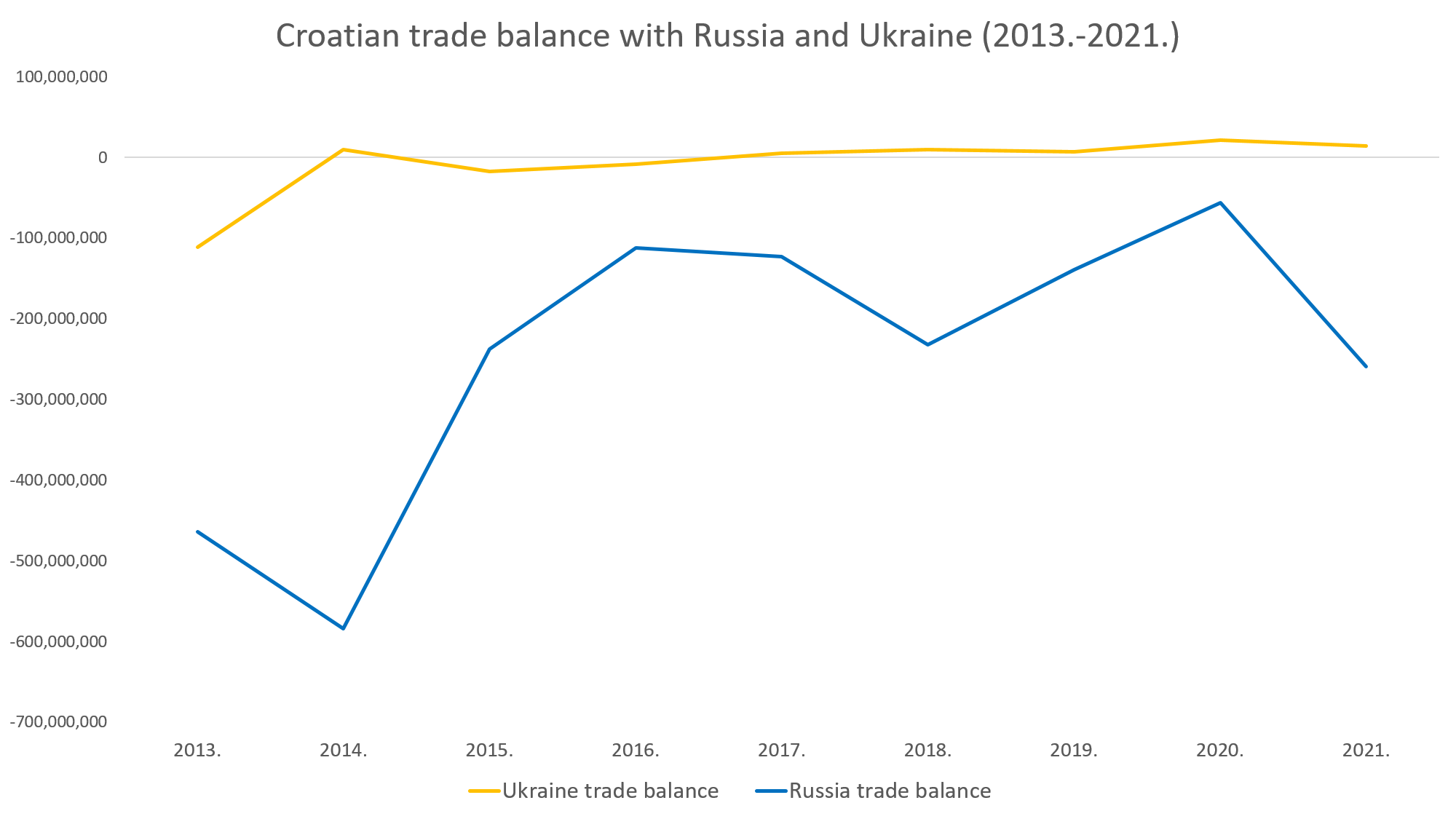
To conclude Croatian foreign trade of goods is not very reliant on the Russian and Ukrainian markets, but the Croatian economy will still suffer the consequences of the imposed sanctions on Russia and from the resulting crisis. Some industries and even more companies are more exposed to these markets and they will hopefully manage this crisis in the best way they can. On the contrary, even though the trade relation with Russia and Ukraine is relatively insignificant, Croatia’s biggest trade partners are mostly European countries which are all impacted to a large extent and the spill-over effect is unfortunately unavoidable.
If you want to find out how the Russian Invasion of Ukraine has impacted the Croatian equity market click here.
All the information provided in this article is taken from the Croatian Bureau of Statistics.
For more, check out our business section.
Bizarre Fake Pro-Putin Zagreb IKEA Photos Circulating in Russia
March the 23rd, 2022 - The situation in Russia is bizarre to say the very least. With the media tightly controlled and threats of imprisonment imposed on those publicly opposing the invasion of neighbouring Ukraine, it's even odder to think that someone has employed their Photoshop skills into creating fake Zagreb IKEA photos which showcase Vladimir Putin.
Do you remember the quote that you'd wish on someone you weren't really the biggest fan in the world of? ''May you live in interesting times''. I think someone has said that to the majority of the population of the world over the last couple of years. As if a pandemic and now a war accompanied by soaring prices wasn't quite enough. Now someone has decided to try to frame Zagreb's IKEA store, of all places, as being a pro-Putin establishment.
As Poslovni Dnevnik writes, the Russian media, which can barely be called free-thinking or independent, reported this week that here in Zagreb, the employees of IKEA are pro-Putin. Yes, you read that right.
''In Zagreb, the capital of Croatia, IKEA employees posted photos of Russian President Vladimir Putin in support of the special operation in Ukraine," Russian media reported.
"In Zagreb, at the local IKEA, portraits of Vladimir Putin were placed in all photo frames in their salons. Obviously, the IKEA employees did it themselves," the Russian channel went onto try to claim to the Russian public.
Based on the results of the audit, IKEA was very quick to confirm that these were fake photos that the state agency RIA Novosti were publishing.
“These pictures are fake and not real photos from the real store. We have no other information so far,'' said a company spokeswoman of the extremely strange Zagreb IKEA photos. The fact that someone has too much time on their hands is evident, but trying to use an IKEA store to clutch at straws for Putin support is perhaps one of the oddest events in this dire situation so far. Even Blahaj the famous IKEA shark looks displeased sitting next to Vladimir.
For more, check our lifestyle section.
Russian Fortenova Co-Ownership Ending Following Ukraine Invasion
March the 21st, 2022 - Russian Fortenova co-ownership will be coming to an end following that country's unjustified invasion of neighbouring Ukraine. The Russian Fortenova co-ownership is otherwise through it's largest commercial bank, Sberbank.
As Poslovni Dnevnik writes, Russia's largest commercial bank, Sberbank, will soon cease to be a co-owner of Croatia's Fortenova Group (former Agrokor). Sberbank's 44 percent Russian Fortenova co-ownership stake will apparently be taken over by the Indotek group, backed by American-Hungarian capital, Vecernji list writes.
The majority owner of the Indotek group is Daniel Jellinek, who, at least according to Forbes magazine, ranks ninth on the list of the richest Hungarians in the world. According to Vecernji list, the in-depth recording process to make room for the business move has begun, and insiders expect the transaction to be concluded within a few weeks.
From the Croatian economic point of view, it is important that Indotek is, in both the business and capital sense, very well connected with the American business conglomerate Bohemian Group, which is owned by the powerful and rich American Stryker family.
Until recently, the Bohemian Group was the second largest single owner of Indotek after Jellinek, with an ownership share of 33 percent, and today it still participates with its capital in various Indotek projects. The Indotek Group is one of the leading investment management companies in all of Central and Eastern Europe.
The main activity of the group is the acquisition of real estate/property and corporate receivables, and their investment portfolio makes it one of the most important players in the region of Central and Eastern Europe.
One of the long-term benefits of this transaction which will end Russian Fortenova co-ownership, if realised, stems from the fact that with the arrival of Jellinek as a potential operational partner of Fortenova in the joint acquisition of international brands and opening new markets in the future, the French retail giant Auchan is mentioned, with which Indotek is negotiating strategic cooperation and ownership alliances.
For more, make sure to check out our business section.
Russian Sanctions Problematic for Croatian Wood Floor Manufacturers
March the 19th, 2022 - Croatian wood floor manufacturers have become an unlikely victim in the harsh but necessary sanctions most of the world has imposed on Russia following its unjustified invasion of neighbouring Ukraine last month.
As Poslovni Dnevnik/Jadranka Dozan writes, the proverbial earthquakes triggered by the Russian invasion of Ukraine across global markets - primarily through supply chain disruptions, and then the prices of energy, food, various industrial raw materials and goods - aren't, of course, bypass the wood sector. Croatian wood floor manufacturers are far from immune.
In addition to an already quite complicated business environment, some new complications related to certain sectors are now beginning to arise almost on a daily basis. This is particularly the case in the wood and paper industries, when it comes to fuel chips, plywood logs and the like. A decision was prepared as a counter-sanction aimed at countries on Russia's hostile list, from the US to the European Union (EU), and is scheduled for the end of the year.
For some European companies, but also Croatian industrial companies and retailers, the related delivery problems are even greater. All of these difficulties only work to further emphasise the long-standing belief that the raw material potential Croatia boasts should be better used.
This means investing in capacities and technology that would result, among other things, in the production of greater added value. It's worth really highlighting the fact that the Croatian wood sector is one of the few industries where the country actually has all of the proper raw materials for the job.
Over recent days, Bjelin, owned by Darko Pervan and which started building a wooden floor factory in Ogulin last year, announced that the group had decided to increase and improve investments in existing facilities and speed up the completion of a new Croatian factory. The company says this should make a significant contribution to replacing part of the wooden floor production capacity that is now being lost in connection with the Russian war against Ukraine.
However, for most of the companies within the HUP-Association of the Wood and Paper Industry, the problems they're facing are currently in a stronger focus.
"Economic sanctions imposed by the EU, and thus Croatia in relation to economic relations with the Russian Federation, as well as the announced decision of Russia to ban the export of birch wood products, are causing very serious problems for Croatian wood floor producers," said Ivica Pasalic, adding that the EU's decisions should point to very high penalties for violating sanctions in any way, including through third countries.
Russia produces 75 percent of the world's birch plywood production and their manufacturers have been the dominant suppliers to a number of our two-layer parquet manufacturers. As Pasalic pointed out, practically all of them have had very serious problems when it comes to production and are in danger of being stopped entirely. Finding alternative solutions, on the other hand, is neither quick nor easy.
The Association also intends to try to arrive to a solution through social dialogue with the competent ministry, because, as he said, a large number of workers work in these factories, and they're threatened with losing their jobs, and companies are shutting down production.
Stjepan Vojinic from the management board of the Bjelin Group pointed out that the situation with the shortage of raw materials and semi-finished products caused by the war in Ukraine is serious for all European producers of various types of wooden floors, but also the wider furniture industry.
The most affected, he said, are those countries that don't have the primary raw materials at hand (mainly oak) in the flooring industry, where Ukraine, Russia and Belarus participated with approximately 30 percent of those total needs. In addition, the issue of the general dependence of the European furniture industry on HDF and plywood, primarily from Russia, is coming to the fore.
As usual, crises can be seen as opportunities. "Nobody likes to have to develop and grow at the expense of other people's troubles, but this is a situation that we didn't want and we couldn't have had any influence over it in any way, so we shouldn't be ashamed of that and we should try to use it," said Vojinic.
The Bjelin Group, he says, is working hard to accelerate its planned investments that will lead to growth in production and implementation of new technologies.
“How successful we'll be depends only on us, because we have to start our production of new Woodur wood floor coverings, which we now have in Sweden, and we'll have that here in Croatia as soon as possible, too. The new plan is to have the final finishing by the end of this year, and the complete production by the end of the next year,'' announced Vojinic.
It's worth noting that Bjelin gets all its oak raw materials from Croatia, but Russia and Ukraine are also large exporters of oak and other wood materials for the flooring industry, and have significant parquet production, which is now directly affected by the war and the accompanying sanctions.
According to company estimates, 25 percent of oak planks produced for European markets come from Russia and Ukraine. Due to all of this, it has been calculated that many construction projects are now in danger of significant delays due to the cancellations of deliveries.
This, of course, doesn' only apply to floor coverings. Other players in the wider wood sector, from wood processors to retailers, are also facing complex supply chain problems owing to the current dire situation between Russia and Ukraine. Some will say that until recently, they "flirted" with foreign partners about prices, and now it's a much bigger challenge to even try to ensure delivery.
Mladen Jambrovic, the first man of Iverpan, says that quarterly or multi-month detailed planning no longer works, now they are much shorter due to disruptions and the general level of unpredictability of deliveries. Demand, he says, is not falling.
The construction sector is quite active, and after the preparations for the tourist season were delayed last year due to the uncertainty surrounding the coronavirus pandemic, this year they started much earlier, which ultimately affects the demand for wood products related to interiors.
Emphasising the complexity of the overall business conditions, he noted that in the production of plywood, for example, goods today are ordered for delivery in two, three or four months. In addition, it is an energy-intensive activity, with gas being the main energy source.
For wood centres and/or furniture manufacturers, there are also problems related to the situation with some ancillary goods, products and markets, from steel (fittings, hinges) to glue, fillers or cardboard; these are all segments of considerable importance to both Ukraine and Russia. All in all, good demand today is accompanied by many "buts", and this will continue to have a very strong effect on Croatian wood floor manufacturers.
For more, make sure to check out our dedicated business section.
Croatian Financial System Shielded From Likely Russian Bankruptcy
March the 17th, 2022 - The Croatian financial system is well protected from the increasingly likely scenario of total Russian bankruptcy following harsh global sanctions placed on them after their unjustified shock invasion of neighbouring Ukraine.
As Poslovni Dnevnik/Tomislav Pili writes, Russian bankruptcy, which is increasingly likely to occur soon, will not be felt by the Croatian financial system, and global finances should not be shaken by such a scenario either, according to Croatian analysts.
After announcing on Monday that the Russian Ministry of Finance will pay out interest to foreign investors in rubles instead of dollars, the story coming out of Moscow altered Russia's state treasury has announced an order has been sent to pay 117.2 million US dollars in coupon interest on Eurobonds it has to pay out to foreign investors this week, dispelling any speculation that it won't be able to meet these financial obligations.
This is what's known as coupon interest on Eurobonds maturing in 2023 and 2024, and Moscow is thus preparing to settle its first foreign debt obligation since the imposition of harsh sanctions following the Russian invasion of Ukraine.
Reuters noted that it couldn't immediately confirm the information on the preparation of these coupon interest payments with the bondholders. The payment of coupon interest in rubles would mean that Russia wouldn't be able to settle its obligations under the bond, so it would have to repay the entire debt. Russia has to settle obligations on 15 bonds issued on international markets worth about 40 billion US dollars, according to Reuters. Approximately half of these bonds are owned by foreign investors.
''The last time Russia failed to meet its financial obligations to foreign investors was more than 100 years ago, after the revolution of 1917, when the Bolshevik Government did not recognise the debt of the then-tsarist Russia. If Russia avoids bankruptcy in its current situation, international markets believe it will only be a postponement of the inevitable.
The recent statement by the head of the International Monetary Fund that Russia's possible bankruptcy is no longer considered an unlikely event actually confirms what has been "read" from financial markets for some time, looking at Russian bond prices, said Mate Jelic,'' an analyst at Erste Bank.
"Russian dollar bonds have been trading at only 15-20 percent of the nominal value for some time now, which actually implies their expected bankruptcy. According to Bloomberg, the total exposure of foreign investors, including debt in rubles and foreign currencies, doesn't exceed 70 billion US dollars, which roughly corresponds to the exposure of Argentina's total debt when the country went bankrupt back in 2020. Even if this worst-case scenario does occur, ie if Russia stops paying the entire amount of its debt held by foreign investors, no major shocks are expected on the global financial market," Jelic assured.
When asked how much the Croatian financial system could be threatened by a possible Russian bankruptcy, the Croatian Financial Services Supervisory Agency (Hanfa) said that, according to their analysis, the Croatian non-banking financial sector is more or less not directly exposed to the securities and financial instruments of Russia, Ukraine and Belarus.
"In Croatia, there are no financial companies from Hanfa's supervision that are directly owned by Russia. Due to the already existing legal restrictions, pension funds are not directly exposed to Russian, Belarusian and Ukrainian financial instruments, nor are they exposed to open-end investment funds and leasing companies,'' they explained from Hanfa. The assets of insurance companies are only 0.5 percent exposed to direct investments in financial instruments of Russian issuers.
"Despite the impact of the war in Ukraine on the Zagreb Stock Exchange, it's important to note that there are no listed financial instruments related to Russian issuers or indices of Russian stock exchanges, so there were no suspensions of trading financial instruments as on other European stock exchanges. In addition, the stock exchange isn't exposed to Russia in terms of ownership, ie to the persons listed on the list of Russian sanctions,'' they concluded from Hanfa.
For more, check out our politics section.
Stjepan Curaj: 6 Suspicious Yachts Tied to Russians in Croatian Ports
March the 15th, 2022 - State Secretary Stjepan Curaj has stated that there are currently six ''suspicious yachts which are tied to Russians'' moored in various Croatian ports.
As Morski writes, State Secretary of the Ministry of Finance, Stjepan Curaj, spoke recently about sanctions put in place against Russians close to Vladimir Putin's regime on RTL. He said that out of a total of 950 oligarchs on the list under current European Union (EU) sanctions, 680 of them were detected on February the 23rd, 2022, as those with direct or indirect ties to the Republic of Croatia.
Stjepan Curaj claimed that it is difficult to talk about the estimated value of their assets and property, and when it comes to movables, he says that six potentially suspicious yachts have been detected moored in Croatian waters and that the procedure surrounding all of that information is ongoing.
He also spoke about the case of a yacht in Betina on the island of Murter, and Stjepan Curaj said that he doesn't know specifically whether it is owned by someone on the infamous list, but in addition to Murter, he says, there are other ports in which this is an issue. He explained the procedure and stated that when it is determined that it is owned or under the control of a person placed on the Russian sanction list, then it is frozen and the Harbor Master's Office prohibits its release and departure. He assumes that this will be the case in Betina as well.
He also mentioned the yacht in Rijeka, which is well-known in the media and which we recently wrote about, and confirmed that it has indeed been frozen.
When asked about sound names involved, he said that Abramovich is the most famous of them all, and when asked if tycoon Vekselberg, who operates down in Dubrovnik and whose property and assets are currently blocked by the USA, is on the list, he claimd that he is on the American list.
As for the consequences for the businesses owned and carried out by these people, and thus for their employees, the Secretary of State says that there is a procedure and clear guidelines. “We need to clearly separate the company from the owner, in that the owner can’t use their company economically and have any financial benefits from it, but we also need to allow it to work because that’s our goal,” he explained.
Finally, he answered the question surrounding confiscated property and the idea coming from Britain to put that property into the function of receiving and caring for Ukrainian refugees. Stjepan Curaj said that sanctions against Russia are prescribed by the 2014 provision and it determines that all property be frozen and be made unable to be used for anything else. If we were to decide to adopt Britain's idea and use it in another way, he says the provision should be changed.
For more, check out our politics section.
Branko Roglic Doesn't Know How Russia Will Survive, Hopes They Go Bankrupt
March the 10th, 2022 - Branko Roglic is very well known name among business and investment circles across the Republic of Croatia, and he, one of the most wealthy Croats at the moment, has stated that he has no idea how Russia will survive the harsh sanctions placed on it, and that he hopes the country goes bankrupt.
As Jutarnji list/Novac HR writes, Branko Roglic, one of the most well off Croats who owns a company that operates in about 20 countries across Europe, including Russia and Ukraine, was a recent guest on Dnevnik Nova TV.
"We have 50 people over in Ukraine. We have 150 people in Russia, as that's a bigger company. At the moment we know that our employees have spoken out against the war and we paid those in Ukraine two salaries as soon as the Russian aggression against that country started, we also offered them relocation to Poland, to which they all said no and instead chose to remain in their homeland,'' Branko Roglic said at the beginning of the conversation.
"At the moment, almost all distribution chains have been cut off and this will affect product prices in every country and when it comes to Russia... I don't know how it will survive that," Branko Roglic said.
The biggest price increase, he said, will be for food products. Last year, a 30 percent increase in inflation was announced, and now he thinks that figure will be even higher. "The government is currently between a rock and a hard place. It can't help the economy much because it has to pay its own costs, it's not easy. No one has experienced blows to the government like Prime Minister Plenkovic has," Roglic commented.
He believes Putin will go on to ban exports to Europe. "They'll certainly do that. We're waiting for counter-sanctions. It isn't easy for the European Union either. Russia cannot last long," he said.
Russia's bankruptcy is predicted by some to occur on April the 15th, when they must repay their first loan to international institutions. "It would be good to get rid of another dictator and get another democratic country that will be a partner for Europe," Branko Roglic firmly believes.
"They thought they would just be able to walk easily through Ukraine and behave in such a way. That they would bring their man to the helm there - that didn't happen. It turned out that the Ukrainians are a much stronger opponent than they could have ever expected. This is a great advantage and opportunity for Europe to unite. I think that the war should end with negotiations and that the Russians should return to the borders of their own country," Branko Roglic added.
As for the question of the sensitivity of the Croatian economy to the ongoing war in Ukraine following Russia's recent unjustified invasion, Roglic believes we're very lucky to have Slavonia and the agricultural richness of that Easternmost part of the country.
For more, check out our politics section.
Intellias Moves Proposed Serbian Centre to Zagreb, Cites Pro-Russian Serbian Govt Views
March the 8th, 2022 - Intellias has posted on social media that it will now move its proposed Serbian development centre, which would have been located in the city of Novi Sad, to the Croatian capital of Zagreb, citing the Serbian Government's pro-Russian position as the reason for the decision.
The company took to Facebook to post the following:
''Dear colleages, partners, and followers,
As you probably know, we've been planning to launch a new development centre in Novi Sad, Serbia recently. However, taking into consideration the pro-Russian position of the Serbian government, we made a decision to move our delivery centre to Zagreb, Croatia.
The reaction of the international communities and governments to the recent events in Ukraine is extremely important to us. Especially when it comes to the countries where our offices are located.
On top of that, Croatia is home to a strong IT community and well-developed infrastructure More than 60,000 IT specialists work in the country. So, it's our strong belief that together we will be able to provide our clients with quality technology solutions and services.
#StandWithUkraine''
For more, make sure to check out our politics section.
Russian-Owned Croatian Villas Line Adriatic Coast, What's Next For Them?
March the 7th, 2022 - Russian-owned Croatian villas are dotted all along the Croatian coastline, but with harsh sanctions in place and Croatia freezing all such properties related to the Russian regime, what's going to happen next with these luxurious properties?
As Poslovni Dnevnik writes, the fact that Kvarner has been very interesting for rich Russian nationals for years now when it comes to buying real estate is proved by the fact that some of the most beautiful villas there are owned by Russians. Opatija, meaning the entire Opatija Riviera, is truly one of the most sought-after destinations for Russians in Croatia to buy luxury apartments and houses in attractive positions. This was confirmed by some of the large property agencies that have been doing business with Russian buyers for years, Novi list writes.
"When we talk about the number of Russian-owned Croatian villas and other properties, as far as foreign buyers are concerned, Russians aren't in the majority here, but they're in the majority in terms of the number of the most exclusive properties owned. We can say that in the period until 2015, there was a craze of wealthy Russian people coming for the most expensive villas in this part of Kvarner, along the stretch from Volosko to Medveja. In that period, they bought property as residential buyers, namely the most exclusive real estate, which was often located along the first row to the sea or with a beautiful view of all of Kvarner,'' said Vjeran Saina, senior agent of the Remax Real Estate Centre.
He explained that Russian citizens could initially buy real property only if they set up a company here in Croatia, but later the situation was simplified and today they can acquire ownership of property defined by the law of reciprocity, ie reciprocity between Croatia and Russia as individual buyers.
Speaking about buyers from the Russian market, Saina said that in fact, after making a purchase, the Russians, as a rule, did not stay long in their newly acquired villas. In conversations they often mentioned that there is a lack of quality content in the Kvarner area, such as shopping and nightlife, which forces them to spend their money, for example, in neighbouring Italy.
As for the interests of Russian buyers, this real estate agent explained that after 2015, the wave of them buying residential real estate in Croatia subsided.
"Competing countries such as Montenegro, Cyprus, Spain, allowed Russians to enter the country without hindrance, but also through other benefits. For example, when buying real estate in Montenegro above the value of 500,000 euros, buyers from the Russian market get the right to permanent residence. Over recent years we've noticed an increase in the interest of Russian buyers in investing. They're interested in large investments in the area of Liburnia. Several projects were successful, but we could also notice some not so successful investments, which were still too big for our area in terms of planning and implementation, and they were simply not well received by the market. Given the current political situation, we haven't noticed that the Russians are turning to Croatia for the sale of the real estate they own in Kvarner. That property has not been frozen and the Russians aren't expressing concern,'' Saina told Novi list, adding that several Russian investors have been operating in Croatia for many years now and said recently that they were doing business as before.
"As agents who are part of the international brand Remax, we're in constant communication with our colleagues, but also sellers and investors from abroad, and we are waiting for the situation to unfold further," concluded Vjeran Sain in reference to Russian-owned Croatian villas and more.
For more, check out our politics section.
Croatian Property Owned by All Entities Close to Russian Regime Frozen
March the 6th, 2022 - All Croatian property owned by entities close to the Russian Federation's regime have been frozen in response to the recent Russian invasion of neighbouring Ukraine.
As Morski/Stipe Majic writes, at a working lunch held with the ambassadors of the European Union (EU), Croatian Prime Minister Andrej Plenkovic clearly condemned the continued Russian aggression against Ukraine, and announced the sanctioning of all persons and real entities related to the Russian regime who own Croatian property, as reported by the Anadolu Agency (AA).
In Zagreb, Plenkovic participated in a working lunch with the Ambassadors of the European Union member states to the Republic of Croatia, hosted by the Ambassador of the French Republic Gael Francois Veyssiere on the occasion of the French Presidency of the Council of the European Union.
After the working lunch, Frano Matosic, State Secretary of the Ministry of Foreign and European Affairs (MVEP), said that Croatian Prime Minister Plenkovic had informed the gathered ambassadors of EU member states about Croatia's views on the current situation in Ukraine.
Matosic pointed out that the condemnation of the aggression against Ukraine is unquestionable by all EU member states, including Croatia, and that support was expressed for the state leadership of Ukraine and the Ukrainian people, while condemning the policy of the Russian Federation.
Matosic said that just before lunch, the Croatian prime minister visited the Plitvice Motel, where Ukrainian refugees are currently being housed, to welcome them and told them that Croatia was open to accepting them, providing adequate education for their children and employment opportunities for adults.
Matosic said that Croatia's sanctions would be directed at the very top of the Russian Federation, especially at oligarchs close to Vladimir Putin's regime and all "those who raised their hand for the independence of self-proclaimed republics in eastern Ukraine."
''Croatia has a clear list compiled within the EU. These are 702 entities, of which about 650 are natural persons, and the rest are legal entities located on the MVEP website. We will sanction them in such a way that these assets (Croatian property owned by them) cannot be sold or provide any benefit. Their Croatian property will not be confiscated, but frozen in accordance with all rights,'' Matosic said.
He emphasised that there are intensive efforts underwat to identify the Croatian property owned by persons and legal entities close to the Russian regime, which are subject to a joint agreement on sanctions.
For more, check out our politics section.


